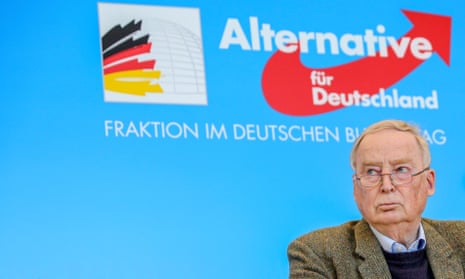The rightwing populist party Alternative für Deutschland (AfD) is to be spied on by Germany’s intelligence agency under suspicion of posing a threat to democracy, according to media reports.
The Bundesamt für Verfassungsschutz (BfV) agency is now able by law to monitor the phones of AfD members and spy on its activities as a suspected extreme rightwing organisation, following a decision that the party argues could affect its chances in the autumn federal elections. It is currently the largest opposition party in parliament.
A longstanding legal wrangle with the party means the BfV is not able to officially announce the decision.
“With a view to the ongoing proceedings and out of respect for the court the BfV will not publicly comment on this topic,” a spokesperson said on Wednesday.
The BfV has been monitoring regional branches of AfD for some time, including in the states of Brandenburg and Saxony. But its decision to place the whole party under surveillance follows a lengthy report drawn up by its own experts in extremism, together with its lawyers, based on reams of statements and speeches given by AfD functionaries and frontline MPs over years, some of which it alleges violate Germany’s constitution.
The AfD rocked the German political scene when it was created in 2013 by a group of Eurosceptics, triggered by opposition to the EU’s bailout of Greece. It quickly became an anti-immigrant force, bolstered by Angela Merkel’s decision not to close Germany’s borders during the refugee crisis of 2015, which led to almost a million migrants arriving in the country.
It quickly established itself as the largest rightwing populist force in Germany, now represented in all 16 regional parliaments, and it became the biggest opposition party in the Bundestag after the last national election. Its support has fallen during the coronavirus crisis, while governing parties’ poll ratings have risen.
The AfD has challenged the BfV’s attempts in court, and said the organisation was attempting to damage its success in the forthcoming election. Analysts say the BfV’s decision could put off conservative voters who have drifted from more traditional parties towards the AfD in recent years.
As long as the court judgment remains outstanding, the BfV has said it will limit its monitoring of the AfD to its ordinary members and will not spy on its national or regional MPs, its candidates for the Bundestag or its European parliament members.









